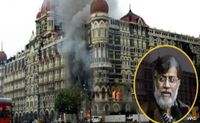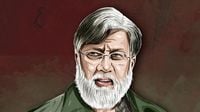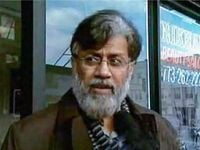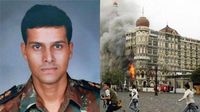Tahawwur Hussain Rana, the key accused in the 2008 Mumbai terror attacks, has officially landed in India following his extradition from the United States on Thursday, April 10, 2025. This significant development marks a pivotal moment in India's ongoing efforts to bring justice to the victims of the attacks that left 166 people dead and many more injured.
Rana, a Pakistani-origin Canadian national, was brought back to India on a special flight escorted by officials from the National Investigation Agency (NIA). The flight landed at Palam Technical Airport, where security was heightened, with paramilitary and Delhi police personnel deployed to manage the situation. He is expected to be taken to NIA headquarters for questioning before being produced before a Special NIA Court in Delhi, possibly at the Patiala House Court.
Rana's extradition comes after a lengthy legal battle, culminating in a decision by the U.S. Supreme Court, which rejected his plea against extradition. Rana was originally detained in the U.S. less than a year after the Mumbai attacks and had been sentenced to 14 years for conspiracy related to a separate terror plot in Denmark. The NIA has been pursuing his extradition since 2009, when it filed a detailed chargesheet against him under the Unlawful Activities (Prevention) Act (UAPA).
What makes this case particularly notable is the cooperation between Indian and U.S. authorities. The U.S. Secretary of State Marco Rubio signed the surrender warrant authorizing Rana's extradition in February 2025, following which his legal team attempted to challenge the decision in court. However, the U.S. Supreme Court's denial of his petition on April 7 paved the way for his return to India.
Rana is accused of assisting his childhood friend, David Coleman Headley, in conducting reconnaissance for the 26/11 attacks, which were executed by ten terrorists from the Pakistan-based group Lashkar-e-Taiba. Headley, who is currently serving a 35-year sentence in the U.S., had previously provided testimony implicating Rana in the planning of the attacks.
The NIA's charges against Rana include criminal conspiracy, murder, and waging war against the country. Investigators believe he played a crucial role in the logistics and planning of the attacks, including scouting targets and facilitating communications between the attackers.
As Rana prepares for interrogation, a multi-agency team, including intelligence officers and counterterrorism psychologists, will be involved in extracting information about the broader network of support for Lashkar-e-Taiba, particularly from Pakistan. This is essential as Rana's testimony could potentially unveil the roles of several key masterminds still at large, including Hafiz Saeed and Zaki-ur-Rehman Lakhvi.
The extradition has been met with mixed reactions in India. While many see it as a victory for justice, political parties are also engaging in a war of words regarding the credit for this diplomatic achievement. The Congress party has asserted that the Modi government merely benefited from the groundwork laid by the previous UPA administration, which initiated the diplomatic efforts for Rana's extradition.
Union Home Minister Amit Shah has called Rana's extradition a "big success" of the current government's diplomacy, while Congress leader P. Chidambaram emphasized that this outcome is a testament to the consistent and strategic approach to international relations initiated under the UPA.
Notably, Israel's Consul General to West India, Kobbi Shoshani, praised the Indian government's efforts, labeling the extradition a "big victory" for diplomacy and a step toward justice for the victims of the 26/11 attacks. This sentiment was echoed by various political figures and victims' families, who have long awaited justice.
As Rana is processed in India, the NIA is preparing to conduct his remand proceedings, which may be held in-camera due to the sensitivity of the case. Tihar Jail officials have confirmed they are awaiting court directions to formally lodge Rana in prison.
Security measures have been intensified outside the Patiala House Court, where Rana is expected to be presented shortly after his arrival. The Delhi Police have deployed personnel from paramilitary forces and conducted thorough checks on visitors to prevent any untoward incidents.
Furthermore, the extradition has reignited discussions about the treatment of terrorism suspects in India. Critics have pointed out the need for a more robust legal framework to handle cases involving terrorism, echoing calls for swift justice without the leniency sometimes afforded to high-profile prisoners.
In a related development, the family of Major Sandeep Unnikrishnan, who was martyred during the 26/11 attacks, expressed their views on Rana's extradition. K. Unnikrishnan described it as a significant diplomatic achievement but emphasized that it should not be seen as the end of the journey for justice. He noted that Rana was merely a link in a larger chain of events surrounding the attacks.
As the legal proceedings unfold, the focus will remain on how Rana's extradition will impact the ongoing fight against terrorism in India and the pursuit of justice for the families affected by the tragic events of November 26, 2008.








